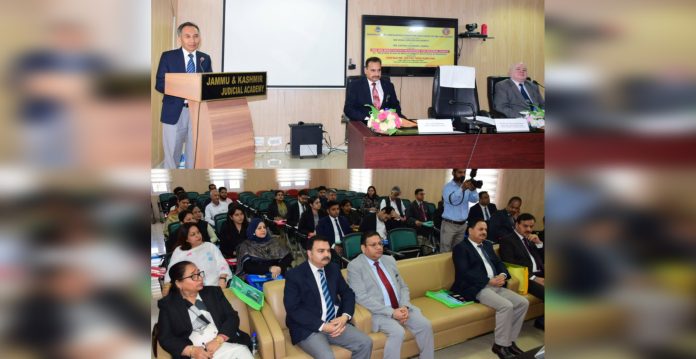JAMMU, Mar 23: Mediation & Conciliation Committee, High Court of J&K and Ladakh in collaboration with J&K Judicial Academy and J&K Legal Services Authority today organized one day sensitization programme for nominated Referral Judges of Jammu province of Jammu and Kashmir on the topic “Mediation and Role of Referral Judges in the Process of Mediation” at J&K Judicial Academy, Jammu.
Justice Tashi Rabstan, Judge, High Court of J&K and Ladakh and Chairman, Mediation & Conciliation Committee, High Court of J&K and Ladakh inaugurated the event.
Vinay Kumar Gupta, Former Principal District & Session Judge, a trained Mediator from MCPC, Supreme Court of India, Yash Paul Bourney, Director, J&K Judicial Academy, Rajinder Saproo, Coordinator, Mediation & Conciliation Committee, Amit Kumar Gupta, Member Secretary, J&K Legal Services Authority and Prem Sagar, Secretary, High Court Legal Services Committee were the Resource Persons for the programme.
While delivering the inaugural address, Justice Tashi highlighted that the mediation embodies principles of cooperation and consensus-building. He said that by prioritizing relationships and collaboration, mediation transcends the limitations of the courtroom and offers a more holistic approach to conflict resolution. He added that mediation empowers individuals to resolve their conflicts swiftly, amicably, and on their own terms. He underlined that the referral judges must possess a thorough understanding of the principles and practices of mediation, as an effective alternative dispute resolution tool in their hands.
Justice Tashi stressed that referral judges play a pivotal role in promoting the use of mediation as an alternative to traditional litigation and huge responsibility lies on their shoulder to make mediation successful. Referring to the dismal figures of cases referred for mediation by the District Judiciary in the UT of J&K during the year 2023, Justice Tashi observed that we are lagging far behind than other States.
He strongly urged upon all the participating referral judges as also the trial judges as a whole to embrace the principles of mediation to foster a legal system that is not only efficient and equitable but also conducive in nurturing harmonious relationships and promoting social cohesion.
Yash Paul Bourney, Director, J&K Judicial Academy, in his welcome address, gave an overview of the programme. Quoting Chief Justice of India, Justice Dr. D. Y. Chandrachud, he said that Mediation offers citizens a forum to not only determines the outcome of their disputes, but also to determine the criteria and standards by which those outcomes are evaluated. He highlighted that mediation as an Alternate or Additional Dispute Resolution mechanism, is not new to India and has been existing as part of dispute resolution mechanism since times immemorial.
He added that mediation in its present form is a much refined and structured concept for effective resolution of disputes with the help of a third neutral person who assists the disputant parties to resolve their differences amicably. He reflected that benefits of mediation are manifold. Firstly, it offers a cost-effective and time-efficient alternative to traditional litigation, sparing parties from protracted court battles and exorbitant legal fees. Secondly, mediation promotes flexibility and autonomy, allowing parties to retain control over the outcome of their dispute rather than surrendering it to a judge and moreover, mediation promotes confidentiality, preserving the privacy of sensitive information and mitigating reputational risks.
Rajinder Saproo, Coordinator, Mediation & Conciliation Committee, High Court of J&K and Ladakh, proposed vote of thanks and also conducted the proceedings of the day-long programme.
The inaugural session was followed by working sessions during which Vinay Kumar Gupta, Former Principal District & Session Judge, Delhi deliberated on the topics of ADR, Code of Civil Procedure 1908, and Mediation Act 2023. The learned resource person also highlighted the role of referral judges and discussed various guidelines for referral judges.
All the sessions were highly interactive during which the participants actively participated and shared their experiences, difficulties and also discussed various aspects of the subject topics. They also raised a number of queries which were answered satisfactorily by the worthy resource person.
Home Latest News Referral Judges Have Huge Responsibility To Make Mediation Successful: Justice Tashi


